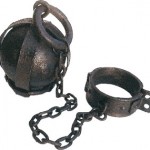Below is the second installment in a three part series entitled “Life in Three Movements: Bound, Released, Transformed.”
RELEASED
The law does not have the power to achieve IN US what it demands of us. We get it. We just can’t do it.
Alone we can’t achieve what civil rights legislation OR ANY LEGISLATION promotes. Nor can we observe the commandments of God. Remember, fail in one part and we have failed in it all. More than a means of escaping our situation, the law highlights our situation, “through the law we become conscious of sin.” It shines a spotlight on how far we check up short or miss the mark.
Depressing? It should be. And it is made worse by our context. Americans are deeply troubled by any notion that we are enslaved when we so boldly and routinely proclaim we are the land of the free and home of the brave. This situation is seemingly hopeless. And it is . . . apart from release
or Movement 2.
Our reality, the truth of our situation, would be hopelessly depressing if it were not for a far more powerful truth: “For even the Son of Man did not come to be served, but to serve, and to give his life as a ransomfor many.”

A People Released!
Let’s unpack that. “For even the Son of Man” means the extraordinary being who is the Son of Man, indeed the Son of God, who is worthy of praise and entitled to our service, even he, serves and gives his life. God tops the parting of the Red Sea, the last great image of massive release, in that he himself achieves the release by himself and at great cost to himself, unthinkable of any Sovereign much less the Creator of the World.
“Did not come to be served, but to serve” He abandons service due him but instead serves us. We forget at times that Christianity is first and foremost about and always begins with what God is doing for us and not what we are doing for him (particularly religious observance). He has chosen to roll up his sleeves and enter our filthy and broken existence to release us from the hopelessly depressing situation in which we find ourselves.
By what means? Just what kind of service does he provide? “To give his life as a ransom for many!” As I ponder contemporary images that illustrate this truth, I am immediately drawn to the movie Gran Torino. In it Clint Eastwood plays a Korean War veteran who did horrific things to the enemy in defense of liberty and freedom of another people. His life is now drawing to a close, and he finds himself living in his Detroit neighborhood among Koreans who were once his mortal enemies. He comes to identify them not as the oppressors but the oppressed. Gangs hold them hostage making life a living hell. This time he chooses not to kill but to instead die to set people free. Everyone thinks and conventional wisdom says Eastwood will take on the gang members removing them one by one at the end of a barrel. But he chooses instead to draw the enemy’s fire under the pretense of being armed. Fully aware of the outcome, Eastwood sacrifices himself. He dies .The gang members are legally imprisoned (the strong men are bound up). His Korean neighbors are liberated from what held them hostage. Life begins again.
This account is utterly and completely Gospel. Sin is our jailer, Death our prison. Jesus takes on the enemy allowing it to destroy him that we might be set free. He satisfies the law and the consequences of breaking it. He suffers our fate only to overcome it in being raised from the dead. Vicariously he suffers for us by paying the price and consequently we vicariously benefit from the satchel of cash in the broken body of Jesus.
The ransom is mentioned numerous times in the New Testament. Ransom is the “instead of price.” Instead of who? Instead of us! “For the wages of sin is death.” “But the gift of God is eternal life in Christ Jesus our Lord.” He died so we don’t have to. “Where, O death, is your victory? Where, O death, is your sting?” Gone. Gone. Gone.
Have you ever pondered the practical implications of being released from death? We often focus on what is to come, that this more glorious future awaits us. And it does. But the truth of “eternal life” impacts life now.
So much pain is heaped upon the world in the interest of avoiding death. With that on the horizon, we spend much of life trying to figure out what will survive it. We amass possessions while others starve. We build decaying monuments that bear our name while souls are lost eternally. We create empires trampling upon nations and people in the process.
As a pastor I’ve experienced this on a smaller scale and at a personal level. Driven men, desiring to create something that cannot go unnoticed and will survive the test of time, labor night and day without end. After all, they have only this life in which to do it. Consequently their wives and children hardly know them. And the sins of the fathers are visited upon the future generations.
Eternal life sets our legacy in perspective. Eternal life means our contribution to the temporal, the fruit of a productive 50 or 60 years, will be small regardless. But positively it means we will be both loved and remembered beyond the number of our days. WE ALREADY HAVE A LEGACY. Our names are written in the Lamb’s book of life. Instead of pouring in to decaying monuments, we can spend our lives alternatively, pouring into men, our spouses, our sons and daughters, indeed all those God sets in our path.
Once in 1988 I found myself on the Pan American highway, between the major city of Cochabamba and the then tiniest of villages called Aramasi, along with others in a precarious situation. We came to a rather sudden stop at a makeshift checkpoint. It was not manned by local police as often was the case but rather by regular army which rightly or wrongly were thought of as thugs in camo. A couple of them boarded the hired bus, machine guns in hand. That had never happened before. They were intense and spoke tersely. I don’t want to overstate the case but missionaries had been “taken out” before. They were considered seditious. My life flashed before me. At 26 I was too young to die. As quickly as the fear welled up so did an unexpected calm. Your legacy is established John. Your future is secure. I didn’t know it immediately but I had been liberated from death.
But we are not only liberated from our prison (death). We are also liberated from our jailer (sin). There can be more fruit in our lives. Sin need not define our future.
First, we must abandon our striving to be perfect and yield to the one who can perfect us. So many of us spend our lives reading the bible for the ultimate list of rules. Compliance with them assures us of favor with God. But here is where our paradigm is often amiss. As previously argued (definitively in my humble opinion), we cannot comply with the law. The law has no power to achieve in us what it demands of us. Nor is the power within us personally. We can only modify our behavior for so long. Regardless we strive in vain for what we have before us. We have already found favor with God. Not out of compulsion but rather out of love, mercy and grace, he came to see us. He remembers us.
Our job is now to yield to the perfecter. We yield to the Holy Spirit who is transforming us into the likeness of the Son (2 Cor. 3). Then we live into the law not by striving to be more like Jesus, but by being more like Jesus having been made that way by a power much greater than ourselves.
We were bound. Now we are released. Ahead we are transformed. On to Movement 3.


